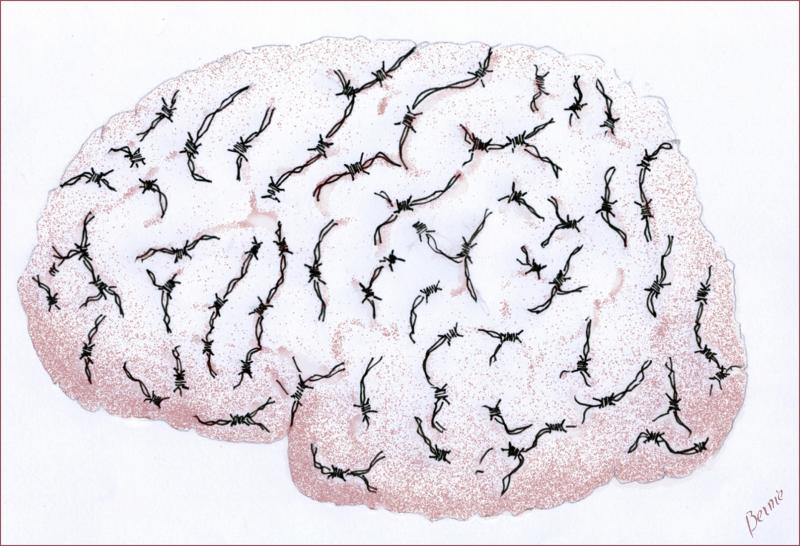
Claire Rodier is a lawyer with GISTI (Groupe d'Information et de Soutien des Immigrés), a French association that provides legal aid to immigrants and the organisations that support them. Rodier is also co-founder of the Europe-Africa network Migreurop.
Voxeurop: As the EU elections approach, what can be said about migration in Europe?
Claire Rodier: The issue of migration has always been used as a tool in the run-up to elections. We're now seeing one-upmanship on it among the various member states. But the obsession, it seems to me, is shared by the EU Commission and the Council – in their absolute insistence that the European Pact on Migration and Asylum be completed before the elections.
We can see a division of roles. There are those who say they don't like foreigners and want to stop them coming. And then there are those who cannot say it but who in practice have positions that are not far removed from that. Officially, the EU cannot adopt a radical stance, so it leaves it to the radicals, but that is the general climate today.
We are openly moving in the direction of policies that make it impossible for fundamental rights not to be flouted. These include the basic principles of the European Union, such as the Charter of Fundamental Rights.
You get the impression that this has become an issue over which countries are at loggerheads, and the issue is no longer really a humanitarian or democratic one.
A migration policy is supposed to take account of human rights, the commitments of the member states, and the international profile of the European Union, as well as the other issues such as border protection, the security of citizens, and so on. But there is no longer a search for compatibility and coherence between these two different aspects. We seem to have passed a point where the focus is now squarely on security aspects and the management of population flows. The whole human-rights dimension has been sidelined.
Do you think that this euphemisation of discourse that we see among certain politicians – those who champion an authoritarian system without saying so – might one day become less euphemistic?
I think so. It's starting to spread. I've been following these issues for a long time and the speeches are much more direct. While I wasn't under any great illusions, it seems to me that now it's no longer a dirty word [to question human rights]. In France, this was said openly not long ago, both by the Rassemblement National (far right) and by Les Républicains (right). When President Emmanuel Macron suggests that a referendum or constitutional reform might be possible, it's a response to the fact that international conventions on fundamental rights take precedence over the French constitution. So yes, the floodgates have been opened.
This might be just another electoral battlefield where you fight for your own advantage and forget about the collateral victims.
That is a broad truth. There's a lot of talk but I'm not sure that the threat posed by migrants, the "invasion", is really a concrete thing for those who brandish this kind of rhetoric.
It would be an exaggeration to say that migratory flows have always been self-regulating. There have always been exceptional situations, related especially to conflicts and international upheavals. But broadly speaking, the basics are as follows: migratory flows are part of the world's sociological and economic fabric, and there is a large ideological element in the rhetoric of those who are staunchly opposed to the phenomenon.
Are we running the risk of being powerless to reverse course? By criminalising people who migrate, and also those who assist migration, we may lose all interest in human rights and humanitarian aid.
That is a real concern. After that, it's not just about migration. Freedoms are being curtailed in other areas. At the moment, in France, for instance, there is a very direct threat to the rule of law – concerning bans on demonstrations, police record-keeping, etc. But I'm not entirely sure that the phenomenon is irreversible. The great upheavals of this world have often occurred because of unforeseen events, or of things that the ruling elite simply never anticipated.
A common argument in favour of migration is not based on humanitarian or moral issues, but on the need for labour, in other words on economic interests. It's an argument that may bother some. Is this the case for you?
It's a constant, and of course it's bothersome, insofar as you get the impression that some of the more moderate, more humanist political circles are clinging to this line of argument. It feels like a last resort. Recently, there was a discussion in France about the future reform of immigration law. The French government wanted to introduce a provision that would allow the regularisation of undocumented workers in sectors with labour shortages.
The left-wing parties, as well as the trade unions and some associations that defend the rights of non-nationals, found it very difficult to take a stand. Because supporting this provision is tantamount to supporting utilitarianism – it only concerns jobs that are in short supply. The alternative position is to reject any selection based solely on the interests of employers, and to insist that all foreigners who are already working illegally should be regularised. But this position is very much in the minority, and even here, when we say that "those who are already working should be regularised", we are talking only about "those who are already working"! This does not take into account other factors, such as integration in France, duration of residency, etc.
Within the Migreurop network and the GISTI, we advocate the right to freedom of movement as a step towards re-establishing equal treatment for all people living on this planet. There is no ethical or moral reason why some people should be able to move anywhere and others only when they are allowed to. Another problem is that if migration depends on the needs of Europe's member states, then it is completely reversible. The day it is no longer needed, the freedom will end, and people will either be expelled or subjected to exclusionary policies. Work is not considered to be a personal right, but rather a simple question of needing third-party labour.
It says a lot about the state of the discourse today, if we can no longer uphold humanitarian values and the law and have to cling to work and utility.
It's very difficult to put forward these principles. And in the current climate, this is not limited to immigration. Demanding respect for fundamental rights is becoming a complicated issue in other areas too.
The way we treat migration says a lot about a society. For example, the way the right is made conditional on usefulness, or just set aside in the name of realism. It also says a lot about the treatment of people in general. Do you share this view?
Of course. Take the example of foreign workers. When you start nibbling away at people's rights because they are foreigners, you also open up loopholes in terms of weakening labour law for others. This is what has happened in France in particular. We have seen a deterioration in labour protections, and it began with the mistreatment of foreign workers. And I think that's a general truth. The way in which people are welcomed – or not – is a symptom of a society's ability to adapt, of people's ability to look at each other, to talk to each other.
Do you like our work?
Help multilingual European journalism to thrive, without ads or paywalls. Your one-off or regular support will keep our newsroom independent. Thank you!
















